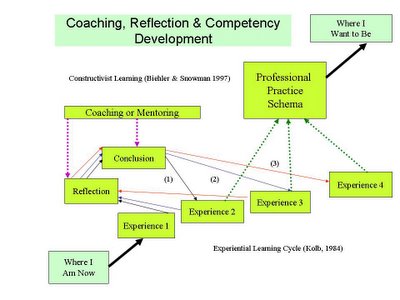Using Blogs to Promote Professional Practice

My interest is in peer assisted learning and how this strategy supports professional development. I have a health care and management background and I advise programs and facilities on how to build learning systems that promote professional development and learning. I became interested in blogs because I see them as a powerful learning community tool. By journalling, and reflecting on practice in an experiential way, the opportunity to learn about one's own professional practice can be augmented using Blogs as a strategy.
If you don't know what a blog is then I would suggest you orient yourself to this web based technology by visiting the following site.
http://www.blogger.com
If we look at the reasoning process in more detail we can identify three essential components that drive professional practice. These three components are knowledge, cognition and metacognition. Professional competency requires having a good knowledge base and the good cognitive skills that enable you to manipulate, use and synthesize the knowledge. However, in order to improve one's competency you also need strong metacognitive or self-evaluation skills. If we integrate this notion of self evaluation into an experiential learning cycle, you can see how excellent practice is developed. Figure 1 illustrates this concept further.

Figure 1 illustrates how the experiential learning cycle and blogging promotes expertise. After each professional practice experience, reflection should take place. This can be done through thinking about practice, writing things in a journal, or better yet, entering reflective comments into a blog (especially if the learning situation is a complex one). By blogging these comments, others can read your thoughts and provide further information on your thinking. In particular, identifying things that you may have missed or did not consider. Your blogging partner, or community of practice, becomes your coaching community and help you to make more grounded and informed conclusions about your experience, which allows you to apply the learning to the next experience. The cycle then repeats itself and you eventually reach where you want to be with respect to your professional competence. The model works and I have attached a list of my publications to further substantiate why coaching and reflective practice is important for professional development.
Publications
Ladyshewsky R. (2006) Building cooperation in peer coaching relationships: understanding the relationships between reward structured, learner preparedness, coaching skill and learner engagement. Physiotherapy. 92:1;4-10.
Ladyshewsky R. (2006) Increasing Transfer of Training with Peer Coaching: From Theory to Practice. In. Evidence-Based Coaching: Volume 2; Theory, research and practice in the behavioural sciences. (Cavanagh M, Grant A., & Kemp T. Eds.). Australian Academic Press, Bowen Hills Qld. Australia. IN PRESS
Ladyshewsky R, Ryan J. (2006) Peer Coaching and Reflective Practice in Authentic Business Contexts: A Strategy to Enhance Competency in Post-Graduate Business Students. In Authentic Learning Environments in Higher Education. Herrignton A. & Herrington J. Eds. Hershey Pennsylvania, Idea Group Publishing. Pp.61-75.
Ladyshewsky, R. (2006) Peer coaching: a constructivist methodology for enhancing critical thinking in post-graduate business education. Higher Education Research and Development., 25:1;67-84.
Ladyshewsky R, Varey W. (2005) Peer Coaching: A practical model to support constructivist learning methods in the development of managerial competency. In. Evidence-Based Coaching: Volume 1; Theory, research and practice in the behavioural sciences. (Cavanagh M, Grant A., & Kemp T. Eds.). Australian Academic Press, Bowen Hills Qld. Australia. Pp. 171-182.
Ladyshewsky R. (2004) The impact of peer coaching on the clinical reasoning of the novice practitioner. Physiotherapy Canada. 56(1), 15-25.
Ladyshewsky R. (2004) E-learning compared with face to face: Differences in the academic achievement of postgraduate business students. Australasian Journal of Educational Technology. 20:3;316-336.
Ladyshewsky R (2002) A Quasi-experimental study of the differences in performance and clinical reasoning using individual learning versus reciprocal peer coaching. Physiotherapy Theory and Practice. 18:1;17-31.
Ladyshewsky R, (2001) Reciprocal Peer Coaching: A strategy for training and development in professional disciplines. Higher Education and Research Development Society of AustralAsia, Canberra.
Ladyshewsky R, (2000) Peer Assisted Learning in Clinical Education: A Review of Terms and Learning Principles. Journal of Physical Therapy Education. 14:2 (15-22)
Ladyshewsky R, Baker R, Jones M. (2000) Peer Coaching to Generate Clinical Reasoning Skills. In, Higgs J, Jones M (Eds.) Clinical Reasoning in the Health Professions, Second Edition. London, Butterworth and Heinemann Ltd. pp. 283-289.
Ladyshewsky R, Barrie S, Drake V. (1998) A Comparison of Productivity and Learning Outcome in Individual and Cooperative Physical Therapy Clinical Education Models. Physical Therapy 78:12;1288-1301.
Ladyshewsky, R. & Gotjamanos E: (1997). Communication Skill Development In Health Professional Education: The use of standardised patients in combination with a peer assessment strategy. Journal of Allied Health Fall:26:4;177-186.
Ladyshewsky R, Drake V. (1997) Co-operative Learning in Clinical Education. In Butorac A. (Ed.) Quality in Practice: Teaching and Staff Development Projects 1996. pp.99-108.
Ladyshewsky, R: (1995) Enhancing Service Productivity in Acute Inpatient Settings using a Collaborative Clinical Education Model. Physical Therapy, 75:6, 503-510.
DeClute, J., Ladyshewsky, R: (1993) Enhancing Clinical Competence Using a Collaborative Clinical Educational Model. Physical Therapy, 73:10, 683-697.
Ladyshewsky, R: (1993) Clinical Teaching and the 2:1 Student to Clinical Instructor Ratio. Journal of Physical Therapy Education, 7:1, 31-35.

0 Comments:
Post a Comment
<< Home